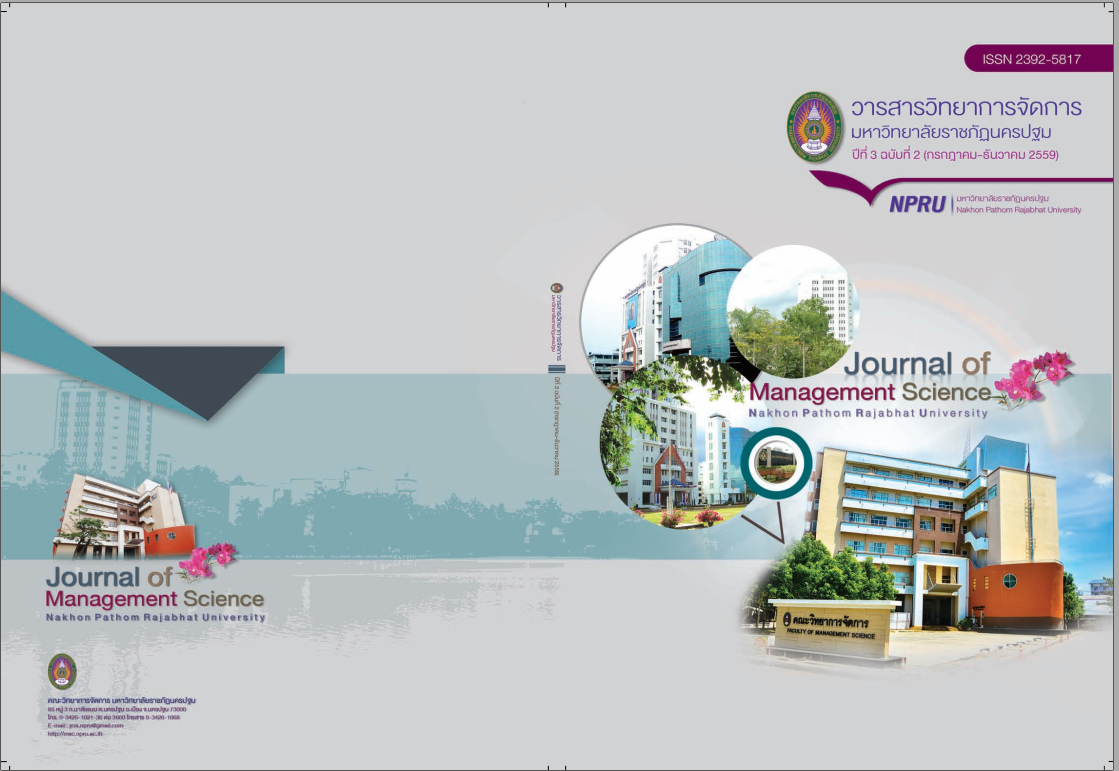The model of participation knowledge management for pomelo in Nakhon Pathom province.
Main Article Content
Abstract
The research has two main objectives: 1) to study the problems in participate knowledge management model for pomelo in Nakhon Pathom Province 2) to create model of participation knowledge management model for pomelo in Nakhon Pathom province. This research all qualitative research approach. The subjects of this study were classified into two groups: 1) the pomelo growers in Nakhon pathom province 20 persons 2) those involved with pomelo Pathom province 10 persons with a purposive sampling.
The study found that.
The issue of the problems in participate knowledge management model for pomelo in Nakhon Pathom Province. (1) How to grow pomelo has inherited from his ancestors from generation to generation. Without improved. (2) development and learning ways was trial and error. (3) exchanging knowledge in a narrow and among relatives only
The building model was as follows. (1) To spread Knowledge Experience and availability to the farmers. And those who have a vested interest Sustainable benefits to the grapefruit crop circles in Nakhon Pathom next. (2) To Distribution pattern knowledge required to make a written record to modify into explicit knowledge back to those who are interested to know the future remain.
Article history : Accepted 17 September 2016
SIMILARITY INDEX = 2.41
Article Details
The views and opinions of the article appearing in this journal are those of the author. It is not considered a view and responsibility of the editorial staff.
References
กรมส่งเสริมการเกษตร. (2549) สถิติเกี่ยวกับส้มโอ. [ออนไลน์] ค้นเมื่อ 13 สิงหาคม 2557. จาก https://www.agriqua.doae.go.th/plantclinic/Clinic/plant/.../index.html.
นิทัศน์ วิเทศ. (2542). การจัดการความรู้ : เทคนิคการแปรความรู้สู่ความได้เปรียบ ในการแข่งขัน. กรุงเทพมหานคร : เอ อาร์ บินิเนส เพรส.
บุญดี บุญญากิจ และคณะ 2549. การจัดการความรู้ จากทฤษฎีสู่การปฏิบัติ. (พิมพ์ครั้งที่ 2). กรุงเทพมหานคร. จิรวัฒน์ เอ็กซ์เพรส.
พรธิดา วิเชียรปัญญา. (2547). การจัดการความรู้ : พื้นฐานและการประยุกต์ใช้. กรุงเทพมหานคร. : เอ็กซเปอร์เน็ต.
วิจารณ์ พานิช.(2548). การจัดการความรู้ฉบับนักปฏิบัติ. กรุงเทพมหานคร : สุขภาพใจ.
สมพร ณ นคร.(2550). การสร้างเครือข่ายเกษตรกรผู้ปลูกส้มโอในเขตลุ่มน้ำปากพนังเพื่อการผลิตส้ม โอให้มีคุณภาพ. [ออนไลน์] ค้นเมื่อ 10 ธันวาคม 2557 จาก https://elibrary.trf.or.th/project.asp?page=133.
สถาบันส่งเสริมการจัดการความรู้เพื่อสังคม. การจัดการความรู้. [ออนไลน์] ค้นเมื่อ 5 มกราคม 2558 .จาก : https://www.bic.moe.go.th/fileadmin/BIC_Document/KM/WedJuly2005-9-16-35- Introduce_KM.pdf.
สำนักงานคณะกรรมการการพัฒนาระบบราชการ. (2553).เอกสารประกอบการชี้แจงเรื่องการจัดการความรู้ (Knowledge Management : KM). [ออนไลน์] ค้นเมื่อ 10 ธันวาคม 2557. จาก https://www.opdc.go.th/ uploads/ files/PMQA/2.KM_53.ppt.
Anantatmula, V. S. P. (2004). Criteria for Measuring Knowledge Management Efforts in Organizations. Doctoral Dissertation, The George Washington University.
Drucker, P. F. (2000). The Coming of the New Organization. Harvard Business Review, 45. 1-19.
Furlong, G. (2001). Knowledge Management and the Competitive Edge. Knowledge Management Research.
Hislop. D. (2009). Knowledge Management in Organizations: A Critical Introduction .(2nd ed.) OUP Oxford.
Lamb, E. C. (2001). Knowledge Management. Community Banker : .24-26.
Nonaka, I., &Takeuchi, H. (1995), The Knowledge Creating Company, New York : Oxford University Press.
Nonaka, I., &Takeuchi, H. (2000). Classic Work : Theory of Organization Knowledge Creation. Personnel Psychology, 159-162.
OECD. (1996). The Knowledge-Based Economy. OECD Paris.
Sarvary, M. (1999). Knowledge Management and Competition in the Consulting Industry.
California Management Review, 41 (2), p. 95-96.


